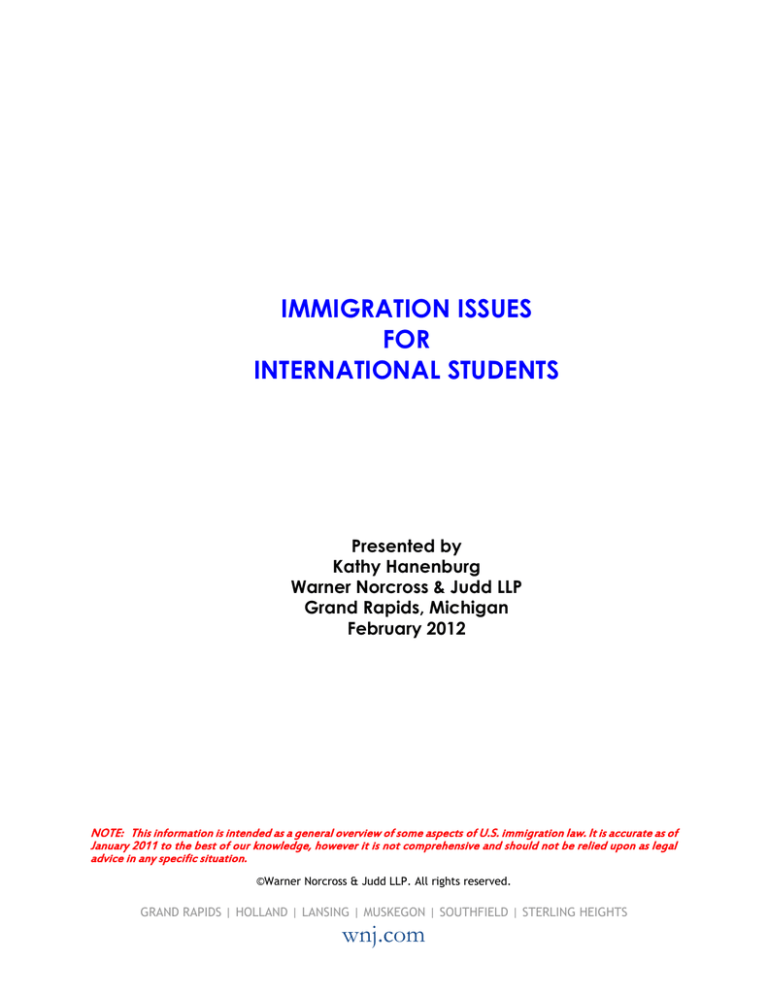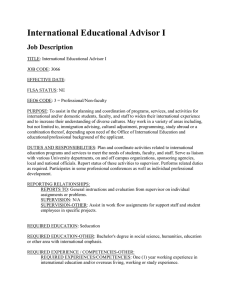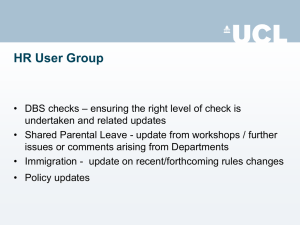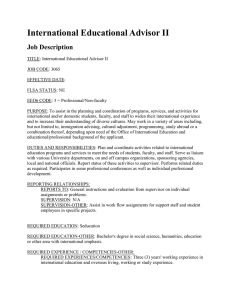
IMMIGRATION ISSUES
FOR
INTERNATIONAL STUDENTS
Presented by
Kathy Hanenburg
Warner Norcross & Judd LLP
Grand Rapids, Michigan
February 2012
NOTE: This information is intended as a general overview of some aspects of U.S. immigration law. It is accurate as of
January 2011 to the best of our knowledge, however it is not comprehensive and should not be relied upon as legal
advice in any specific situation.
©Warner Norcross & Judd LLP. All rights reserved.
GRAND RAPIDS | HOLLAND | LANSING | MUSKEGON | SOUTHFIELD | STERLING HEIGHTS
wnj.com
IMMIGRATION 101
I.
INTRODUCTION TO U.S. IMMIGRATION LAWS
Foreign nationals are allowed to enter the U.S. in one of two broad categories, nonimmigrant and
immigrant. Nonimmigrants are given a specific “period of stay” (ranging from 90 days to several years),
while people who enter the U.S. with an “immigrant visa” are then granted permanent resident status. A
nonimmigrant is permitted to engage in only those activities for which the visa was granted, while
permanent residents have many of the same rights as citizens (such as being able to hold any job or move
anywhere within the country), other than the right to vote.
The most common nonimmigrant categories include students, tourists, business visitors and individuals
with various types of work authorization, including outstanding artists, performers and athletes;
professionals with specialty degrees (such as accountants, engineers and computer systems analysts);
investors who come to the U.S. to open a new company, and managers and executives of multinational
companies who are transferred from a foreign branch to a U.S. branch of the company.
There is currently a quota for professionals with specialty degrees – 65,000 per year plus an additional
20,000 for people who hold U.S. masters degrees. There is no quota for students, visitors, outstanding
artists and athletes or multinational executives and managers.
Immigrant visas are divided into two principal categories, “family-based” and “employment-based.” In
family-based immigration, a family member – spouse, parent, sibling or adult-child – files a petition for the
beneficiary. Once the petition is approved, the beneficiary is either immediately eligible for an immigrant
visa (spouses, minor children and parents of a U.S. citizen) or is placed on a waiting list. Similarly, an
employer may file an immigrant petition for an employee and depending on the category, once the petition
is approved the employee will either be immediately eligible for permanent resident status or will be placed
on a waiting list.
A person who enters the U.S. without obtaining a visa and without being formally admitted by a U.S.
immigration officer is characterized as having “entered without inspection.” At the present time, there is
no legal pathway for a person who enters without inspection to obtain lawful status, even if the person
marries a U.S. citizen.
A person who enters the U.S. legally and is given a definite period of stay, and who then overstays for
more than six months, will be barred from re-entering the U.S. for a period of three years. A person who
overstays by more than one year will be barred from re-entering for 10 years.
Current immigration law requires deportation in a number of circumstances where a foreign national, even
one who is a permanent resident, commits a seemingly minor crime. In interpreting these provisions of
federal law, the immigration service has often argued for a very broad interpretation of what constitutes a
deportable offense. Currently, the Department of Homeland Security is focusing on locating and deporting
foreign nationals who have been convicted of serious crimes.
II.
IMMIGRATION BASICS FOR FOREIGN NATIONALS
1.
Foreign nationals in the United States do not have the rights that U.S. citizens take for
granted.
Noncitizens should assume that whatever is not permitted is restricted or prohibited, including
things like:
○
working
○
going to school
○
moving from one address to another
○
changing jobs
○
activities of family members
○
leaving and returning to the U.S.
○
Constitutional protection against self-incrimination
○
effects of plea bargains and guilty pleas (particularly dangerous for
long-term permanent residents)
2.
Immigration rules are strictly enforced. “Minor” violations can have major
consequences.
Severe penalties may result from seemingly minor violations of immigration law.
Overstaying the date on your I-94 card by even a single day can result in cancellation of
your visa and subject you to the requirement of returning to your home country for all
future changes in status. Accumulating a period of six months or more of "unlawful
presence" may result in a three-year bar against entering the United States. One year or
more of unlawful presence may result in a 10-year bar.
Your life may be an “open book” every time you enter the United States. The border
officers have access to more databases than ever before. This trend will increase. Legal
infractions, which may appear to you to be relatively minor, can be grounds for removal.
An applicant for admission who appears to the admitting officer to be engaging in fraud or
the use of fraudulent documents may be summarily barred from entering the United States
for five years. In addition, any type of misstatement at the time of entry may come back to
haunt you years down the road. Finally, a person who enters the United States without
inspection will, in all likelihood, be permanently barred from ever being able to obtain
legal status from within the United States.
If you are from one of the countries listed below, make sure you stay familiar with the
special rules that might apply to you.
SPECIAL REGISTRATION REQUIREMENTS
Iran
Iraq
Libya
Sudan
Syria
3.
Plan ahead.
Afghanistan
Pakistan
Algeria
Saudi Arabia
Bahrain
Eritrea
Lebanon
Morocco
North Korea
Oman
Qatar
Somalia, Tunisia, United Arab Emirates, Yemen
Bangladesh
Egypt
Indonesia
Kuwait
Jordan
Everything takes time – more time than you can imagine. Compared with other
government agencies, the immigration service faces enormous backlogs. Consequently, its
processing times are measured in years, not months. It is never too early for foreign
nationals to do immigration planning.
The length of time it takes to process an application can vary widely, so make sure that if
you intend to apply for a change of status or a work card, you allow as much time as
possible for processing.
4.
Information obtained from various government sources may not be reliable.
Generally speaking, the official USCIS (United States Citizenship and Immigration
Services) web site is reasonably current and accurate. This site is found at uscis.gov.
Information obtained from other sources may be inconsistent or incomplete.
5.
Information obtained from other beneficiaries, and from many immigration web
sites, is not reliable.
The experience of other beneficiaries in dealing with the immigration service is no
guaranty of how your situation or your application will be treated. It is not uncommon for
different USCIS examiners to reach differing decisions on similar applications.
With respect to immigration web sites, be aware that professional practice standards vary
widely. Free information is often unreliable. Obtain as many references as possible
before selecting an immigration attorney.
6.
Deadlines are real. Missing a deadline is seldom, if ever, excused.
We advise our clients to calendar all important dates and, in addition, to calendar reminder
dates well in advance of actual deadlines.
7.
Do not assume that "no news is good news." Follow up if you have not had a
response within an appropriate period of time.
The immigration service web site shows the current processing times for particular types
of applications. If you have not heard from the service within the processing time stated,
you must follow up on the status of your application. It is not uncommon for applications
to be misplaced, and without follow-up by the applicant, the application will never be
processed. In order to help the immigration service be efficient, however, it is not
recommended that you call before the stated processing time has expired.
8.
Be aware of all travel and employment restrictions that apply to your current status
and the status of your dependants.
For example, most dependants are not permitted to work, although in most cases they may
attend school. If the principal beneficiary undergoes a change of status, for example, from
R-1 to F-1, it is generally necessary that a change of status be obtained for all dependants
as well. Do not leave the U.S. while a petition for a change of status is pending.
9.
Know and understand the “dual intent” rules if they apply to your status.
If you violate them, you could miss your own wedding. These rules apply to B, F, J, TN,
and certain other statuses.
10.
Do not, ever, under any circumstances, make a false or misleading statement,
written or oral, to the immigration service, or in connection with obtaining an
immigration benefit.
Many potential problems can ultimately be resolved with some patience and by supplying
additional information or documentation on points which have been questioned. In our
experience, however, the single act most likely to result in an irreversible denial of
immigration benefits is the determination that an applicant has deliberately falsified
information.
11.
Failure to follow certain simple requirements can result in deportation.
As part of increased security efforts, the USCIS has reiterated that foreign nationals
residing in the United States for more than 30 days must notify the USCIS of all changes
of address within 10 days of such change. Foreign nationals are also required to carry
with them at all times proof of their lawful status in the United States. Failure to register a
new address with the USCIS or carry proof of lawful status could result in a fine,
imprisonment and/or removal from the United States.
12.
Failure to naturalize is risky.
Green card holders should consider applying for U.S. citizenship as soon as they are
eligible to do so.
III.
INTRODUCTION TO EMPLOYMENT-RELATED VISAS
B = Business Visitors
○
○
○
Compensated by foreign employer
Activities benefit foreign employer
No "productive employment" for U.S. employer
NOTE: The additional categories of employment visas discussed below are "employer-specific,"
that is, they authorize the alien to work only for the employer who filed the petition on behalf of the
alien. There is no automatic procedure for "transferring" employment authorization from one
employer to another. Generally speaking, the second employer must go through the same process
as the first employer.
H-1B = Professionals in a Specialty Occupation
○
Basic requirement is a college degree (or equivalent) in an area related to job duties.
Examples: computer systems analysts, accountants, engineers, architects, physicians.
Gray areas: lower-level computer professionals, business specialties (sales, human
resources). Equivalency: three years relevant progressive experience = one year of
college
○
Timetable:
Standard processing is three to four months
Premium Processing is 15 days
○
Valid for three years, with additional renewals for a total of six years
○
Prevailing wage and record-keeping requirements apply
○
"H-1B Cap": USCIS fiscal year begins October 1. For fiscal 2011, 65,000 visas were
available, plus an additional 20,000 for applicants holding a masters degree from a
U.S. university. The application period opened on April 1, 2010 and there are
approximately 5,000 visas remaining. NOTE: Only new H-1B visas are counted
toward the cap. Persons already present in the U.S. with H-1B status may seek a
new H-1B that will permit them to work for a new employer without being subject to
the cap.
○
Employers must pay the costs of obtaining H-1B status.
TN = Canadians and Mexicans in Designated Occupations
○
○
○
○
○
○
Available only to Canadian and Mexican citizens
Available only for certain occupations
Documentation: support letter from employer, required diplomas and transcripts,
proof of Mexican or Canadian citizenship
No prevailing wage determination or Labor Condition Application for Canadian TN's
Valid for up to three years, with renewals possible
Dual intent NOT permitted (should not be used for employee who intends to
pursue a "green card" or who has other factors that suggest immigrant intent, e.g.,
marriage to a U.S. citizen)
L-1 = Intracompany transferees
○
○
○
○
○
○
○
○
○
Transferees from a qualifying foreign "affiliate" (foreign branch office, parent,
subsidiary)
Employed by foreign affiliate for at least one year (exclusive of time spent in the
U.S.)
L-1A = Executive, manager (must have at least second-tier responsibility or be
managing degreed professionals), "manager of a function;" L-1A's may subsequently
petition for a green card without first obtaining labor certification
L-1B = Specialized knowledge of the employer's products, processes or procedures
No prevailing wage determination or Labor Condition Application
Required documentation includes organizational charts showing position with foreign
affiliate and proposed position with U.S. employer; affidavit concerning qualifying
relationship
Validity periods:
L-1A: Three years + two years + two years
L-1B: Three years + two years
Filing of petition with USCIS (30-120 days); Canadian L-1's may file initial petition
at a port of entry or pre-flight inspection center
Dual intent permitted
Family Members.
○
Spouses and unmarried minor children may obtain H-4, TD, or L-2 status to
accompany the principal beneficiary.
SUMMARY OF EMPLOYMENT AUTHORIZATION
FOR NON-U.S. CITIZENS
Category
General
Application
Processing
Period of Validity
Requirements/Com
Process
Times
Business meetings;
Visa from U.S.
Depends on
Visa:
cannot engage in
consulate or Visa
consulate;
Depends on country -
"productive
Waiver Program
currently about 2
generally 5 years
ments
B-1
Business Visitor
employment"
– 4 weeks
Stay:
1 to 6 months
depending on purpose
of visit
H-1B
Professional
(subject to
quotas)
Position must require
Prevailing wage
at least a 4-year
determination;
degree or equivalent.
”labor condition
Job must be a
application” filed
"specialty occupation"
and “public access
file” created;
Applicant must have
a relevant
4-year
degree or equivalent
experience
Petition filed with
USCIS
1 - 6 months
Up to 6 years
L-1
Intracompany
Transferee
Transfer from foreign
Petition filed with
60 days – 120
Manager/
"related" company;
USCIS; Canadians
days
executive - up to 7
employed by foreign
may file at the
company for at least
border.
1 year during 3-year
Spouse may obtain
Specialized knowledge
period immediately
work authorization
- up to 5 years
years
preceding transfer;
executive, managerial
or specialized
knowledge position
(before & after
transfer)
F-1
Student
Can work only with
Form I-20 issued
Depends on the
Up to one year (full
authorization from
by school;
school for I-20;
time) or two years
school (part-time)
Visa issued by
or
with
U.S. consulate;
90 – 120 days for
"Employment
EAD issued by
EAD
Authorization
USCIS
(half time); = 17
months additional work
authorization for
science, technology,
engineering, and
Document" ("EAD")
mathematics graduates
issued by USCIS
(full time)
J-1
Exchange Student
Generally used by
Must go through
college students or
an approved
recent graduates
exchange program;
3 months
Generally up to 12
months
DS-2019 issued by
sponsor authorizes
employment
TN
Canadian or Mexican
Application
Same day
Valid for up to three
citizen, only in
submitted at port
years;
certain occupations
of entry
renewals possible; can
not apply for green
card while in this
status
Permanent
Resident
Employer-sponsored
Labor certification
6 – 12 months
green card usually
requires the
authorization;
I-140 Petition
employer to
4 – 6 months
document that no
U.S. worker was
available
Permanent employment
I-485 Application
upon approval,
beneficiary can work
for any employer
1 year or more,
depending on
quotas




